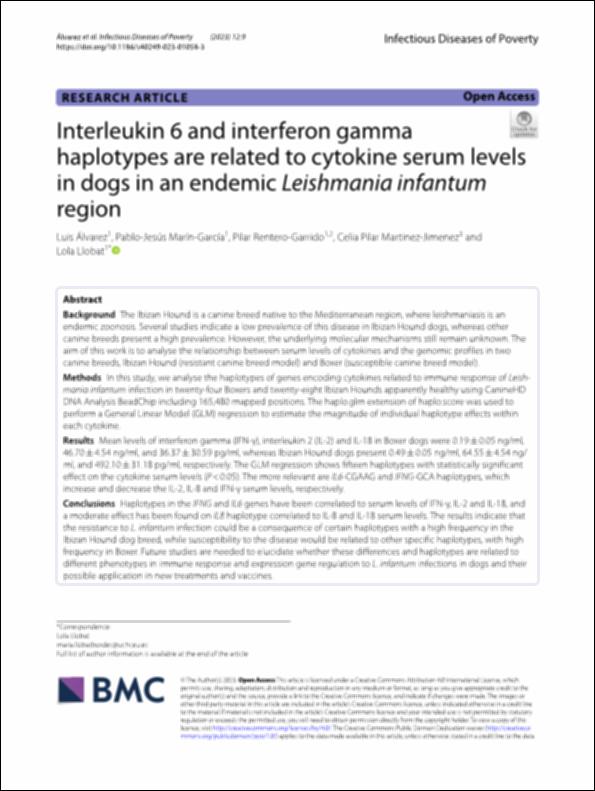Por favor, use este identificador para citar o enlazar este ítem:
http://hdl.handle.net/10637/16069Interleukin 6 and interferon gamma haplotypes are related to cytokine serum levels in dogs in an endemic "Leishmania infantum" region
| Título : | Interleukin 6 and interferon gamma haplotypes are related to cytokine serum levels in dogs in an endemic "Leishmania infantum" region |
| Autor : | Álvarez Fernández, Luis Marín García, Pablo Jesús Rentero Garrido, Pilar Martínez Jiménez, Celia Pilar Llobat Bordes, Lola |
| Materias: | Leishmaniosis; Leishmaniasis; Perros; Dogs; Inmunología veterinaria; Veterinary immunology; Citoquinas; Cytokines; Genética animal; Animal genetics |
| Editorial : | BioMed Central |
| Citación : | Álvarez, L., Marín-García, P.J., Rentero-Garrido, P., Martinez-Jimenez, C.P. & Llobat, L. (2023). Interleukin 6 and interferon gamma haplotypes are related to cytokine serum levels in dogs in an endemic "Leishmania infantum" region. Infectious Diseases of Poverty, vol. 12, i. 1, art. 9 (10 feb.). DOI: https://doi.org/10.1186/s40249-023-01058-3 |
| Resumen : | Background The Ibizan Hound is a canine breed native to the Mediterranean region, where leishmaniasis is an endemic zoonosis. Several studies indicate a low prevalence of this disease in Ibizan Hound dogs, whereas other canine breeds present a high prevalence. However, the underlying molecular mechanisms still remain unknown. The aim of this work is to analyse the relationship between serum levels of cytokines and the genomic profiles in two canine breeds, Ibizan Hound (resistant canine breed model) and Boxer (susceptible canine breed model). Methods In this study, we analyse the haplotypes of genes encoding cytokines related to immune response of Leishmania infantum infection in twenty-four Boxers and twenty-eight Ibizan Hounds apparently healthy using CanineHD DNA Analysis BeadChip including 165,480 mapped positions. The haplo.glm extension of haplo.score was used to perform a General Linear Model (GLM) regression to estimate the magnitude of individual haplotype effects within each cytokine. Results Mean levels of interferon gamma (IFN-γ), interleukin 2 (IL-2) and IL-18 in Boxer dogs were 0.19 ± 0.05 ng/ml, 46.70 ± 4.54 ng/ml, and 36.37 ± 30.59 pg/ml, whereas Ibizan Hound dogs present 0.49 ± 0.05 ng/ml, 64.55 ± 4.54 ng/ ml, and 492.10 ± 31.18 pg/ml, respectively. The GLM regression shows fifteen haplotypes with statistically significant effect on the cytokine serum levels (P < 0.05). The more relevant are IL6-CGAAG and IFNG-GCA haplotypes, which increase and decrease the IL-2, IL-8 and IFN-γ serum levels, respectively. Conclusions Haplotypes in the IFNG and IL6 genes have been correlated to serum levels of IFN-γ, IL-2 and IL-18, and a moderate effect has been found on IL8 haplotype correlated to IL-8 and IL-18 serum levels. The results indicate that the resistance to L. infantum infection could be a consequence of certain haplotypes with a high frequency in the Ibizan Hound dog breed, while susceptibility to the disease would be related to other specific haplotypes, with high frequency in Boxer. Future studies are needed to elucidate whether these differences and haplotypes are related to different phenotypes in immune response and expression gene regulation to L. infantum infections in dogs and their possible application in new treatments and vaccines. |
| URI : | http://hdl.handle.net/10637/16069 |
| Derechos: | http://creativecommons.org/licenses/by/4.0/deed.es Open Access |
| ISSN : | 2049-9957 (Electrónico) |
| Fecha de publicación : | 10-feb-2023 |
| Centro : | Universidad Cardenal Herrera-CEU |
| Aparece en las colecciones: | Dpto. Producción y Sanidad Animal, Salud Pública Veterinaria y Ciencia y Tecnología de los Alimentos |
Los ítems de DSpace están protegidos por copyright, con todos los derechos reservados, a menos que se indique lo contrario.


